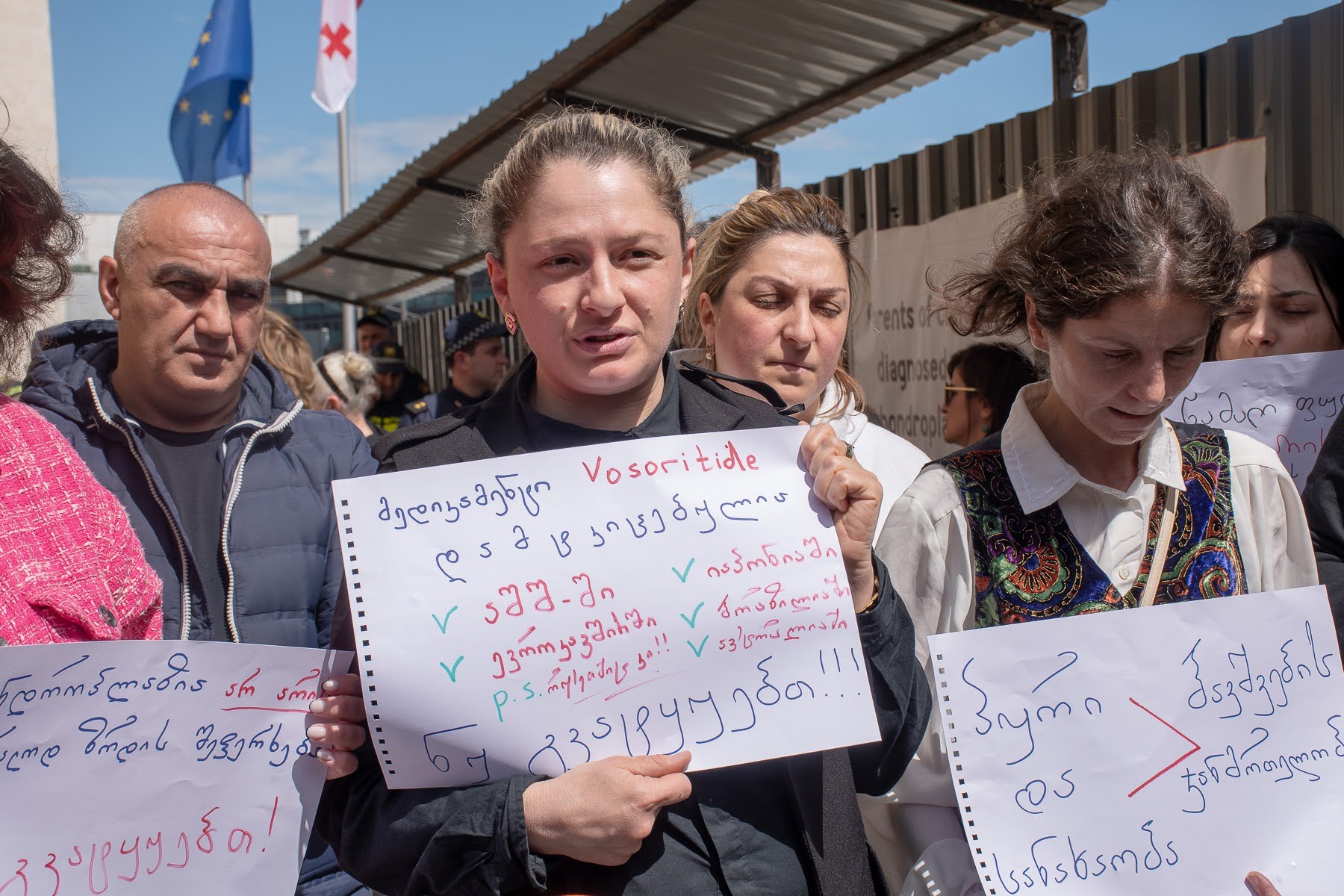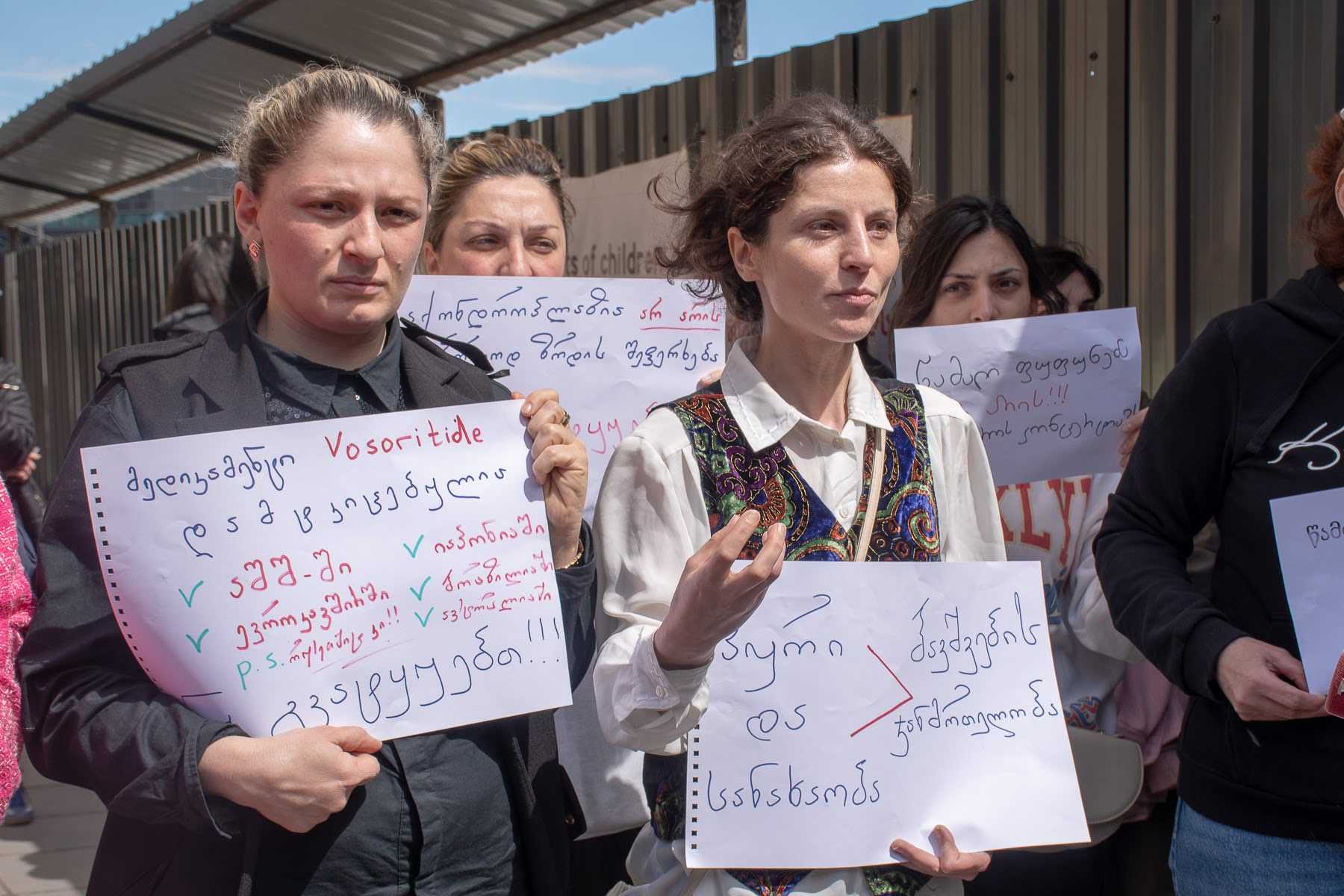
A group of parents of children with achondroplasia, a genetic bone growth disorder, have been protesting continuously in front of the Government Chancellery for the past five days to demand the state provide the medicine needed to treat their children.
The parents, supported by members of several political parties and civil society groups, attempted to block the road near the government offices but were stopped by the police.
On Sunday, the protesters marched along Rustaveli Avenue before regrouping in front of the nearby Government Chancellery to spend their fourth night there.
Over ten parents, primarily mothers, have been protesting outside the building and demanding an audience with Prime Minister Irakli Gharibashvili since 19 April.
Over the weekend, they were joined by members of political groups including the United National Movement , Lelo, Girchi — More Freedom, For Georgia, and For the People.
Achondroplasia is a rare genetic bone growth disorder commonly resulting in disproportionately short stature, an excessive outward curvature of the spine, short limbs, and an oversized head.
The protesting parents maintain that vosoritide, a medicine developed in recent years, is necessary for the treatment of their children. They claim that the government falsely cites a lack of adequate testing for the new drug to avoid covering its $200,000 annual costs.
Vosoritide, marketed as VOXZOGO, was developed by BioMarin Pharmaceutical and has already been approved for treating achondroplasia in the US and EU. It is given as a daily injection to children with achondroplasia.
Sunday’s rally culminated in a fiery speech delivered by Lazare Leladze, a Georgian who grew up with the disorder.
‘I did not come here today to demand medicine for myself. It is too late for me, I don’t need it, but I don’t want these kids to go through the pain that I went through’, Leladze said, referring to several children with achondroplasia whose parents were protesting.
‘They frame it as if their lives are in danger; this is a lie’
Before commencing Monday’s government session, Prime Minister Irakli Gharibashvili said that he ‘understood the [protersters’] emotions’ while expressing scepticism about the benefits of the medicine.
‘For those who are not aware of this case, they tell us to give the medicine to the children as if everything will change if we give it to them’, said Gharibashvili. ‘They also frame it as if their lives are in danger, which is a very big lie’.
Gharibashvili also said that the state would have to take full responsibility for any adverse effects the medicine might have, echoing similar concerns made earlier by the Ministry of Health.
‘If, by giving this medicine, the health condition of these children can become so complicated that it gets worse, then it will of course be our responsibility in this case’, he said. ‘We do not want that to happen; we need to wait’.
The European Medicines Agency has concluded that the side effects of the drug are ‘manageable’ and that the ‘benefits are greater than its risks’.
On Saturday, the leader of the Lelo party, Mamuka Khazaradze, called on the government to create a fund to help children with achondroplasia by providing them with vosoritide. He offered to contribute ₾100,000 ($40,000).
On Monday, Georgia’s Public Defender, Levan Ioseliani, said he was ready to meet the protesting parents, without specifying when he planned to do so.
‘We have been involved in the process of solving their problems for a long time now. On our initiative, a working group was created with the Ministry of Health, and within the framework of our mandate, we mediate this process. We are involved in all of this’, he said.
Unwelcome alternatives
The parents of children with achondroplasia have been campaigning for the import of vosoritide to Georgia for a year.
In October 2022, Zaza Lominadze, the chair of the parliament’s healthcare and social issues committee, promised that the state would obtain the medicine in 2023.
The parents launched an online petition and started protesting in front of the Ministry of Health on a daily basis in March before moving to round-the-clock protests at the Government Chancellery.
Last Thursday, Health Minister Zurab Azarashvili offered parents state assistance in funding physiotherapy and diagnostic services as an alternative to vosoritide.
Keti Begiashvili, one of the protesting parents, said the minister’s statements were ‘offensive’.
Begiashvili said that her child suffered from sleep apnea — a common complication of achondroplasia.
‘[Azarashvili] offered to help my child with a CPAP machine [a device used to treat sleep apnea] instead of a medication that would address adverse symptoms like this’, she said.
In a meeting with some of the parents on Friday, Azarashvili promised that Georgia would follow suit if ‘several EU countries’ obtained vosoritide for those with achondroplasia by the end of September.
While no official figures are available, the campaigning parents claim that approximately 30 people in Georgia have achondroplasia, among them 12 children who could benefit from the drug out of roughly 16–17 minors nationwide.






